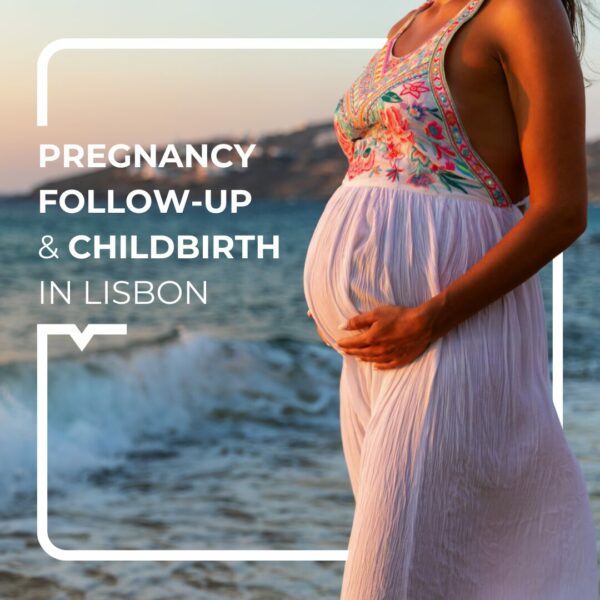Nausea, dizziness, late periods… Panic stations! What if it’s a baby? Hello, this is Dr Joy! I will talk about pregnancy in Lisbon!
Breathe in. Breathe in. Calm down. A pregnancy abroad is always a bit stressful. But as you’ll see, here in Portugal, everything turns out fine.
Let me explain everything to you.
Recommended pregnancy appointments in Portugal
When your pregnancy is confirmed by your doctor, you will receive a pregnancy booklet that contains all the medical information about your pregnancy. This booklet should be brought to every appointment and on the day of the birth. It can also be used as proof for your employer.
Throughout your pregnancy, you will have regular check-ups.
Pregnant Portuguese women (or foreign women who have lived in Portugal for more than 90 days) are entitled to free consultations during pregnancy and 60 days after the birth.
To do so, they must go to the health centre, inform them that they are pregnant and ask to be monitored by a family doctor.
Recommended visits:
The first visit to your family doctor or gynaecologist-obstetrician should ideally be made between the 7th and 9th week of amenorrhoea as this will make your pregnancy official. This is also where you will receive your pregnancy certificate.
The second visit will take place at the first trimester ultrasound, carried out between the 12th and 13th week. From then on, it’s once a month until 30 weeks, every 2-3 weeks between 30 and 36 weeks, and then every week between 36 weeks and delivery.
Follow-up medical visits can be made to your family doctor in the case of a low-risk pregnancy, i.e. without any associated illness.
Blood tests:
The first blood test is carried out between the 9th and 10th week.
The second blood test is done between the 24th and 28th week. This is also an opportunity to carry out a glucose tolerance test in order to reveal any gestational diabetes.
This is a universal screening test for all pregnant women, except those who already have diabetes.
The main ultrasounds:
The first obstetric ultrasound is performed between 12 and 13 weeks. Its main purpose is to determine the baby’s risk of Down’s Syndrome, which is based, among other factors, on the measurement of nuchal translucency.
The second ultrasound, scheduled between the 22nd and 24th week, is called morphological. It allows for an in-depth and detailed study of the foetal anatomy and thus excludes certain major malformations.
Finally, the third main ultrasound is carried out at around 32 weeks. This is used to obtain an estimate of the baby’s weight.
Carrying out pregnancy examinations in Lisbon
Alegria Medical Centre is delighted to support you throughout your pregnancy.
The 12th, 22nd, and 32nd-week ultrasounds can now be performed directly at our clinic.
You can book your appointment here: Obstetric Ultrasound Appointment.
The blood tests required for your follow-up can also be done at Alegria.
You simply need to come to the clinic between 8:30 a.m. and 12:00 p.m..
Only the glucose tolerance test (OGTT) must be carried out in an external laboratory.
Here are a few options if needed:
- SYNLAB Lisboa (Av. Liberdade)
Av. da Liberdade 129 2º A, 1250-096 Lisboa
+351 213425184
Mon – Fri : 8:00 -13:00 /14:00 – 17:00
- Affidea IMI República
Av. República 99B, 1050-190 Lisboa
+351 213189300
Mon – Fri : 8:00 – 20:00 | Sat : 8:00 – 13:00
- SYNLAB Praça de Espanha
Av. Columbano Bordalo Pinheiro 75 A, 1070-061 Lisbon
+351 217216066
Mon – Fri : 7:30 – 19:00 | Sat : 8:00 – 13:00
- Joaquim Chaves Saúde – Clínica de Entrecampos
Av. da República 101 1ºA, 1050-190 Lisboa
+351 211122530
Mon – Fri : 8:00 – 20:00 | Sat : 8:00 – 13:00
- Análises Clínicas SYNLAB Amoreiras – Lisboa
R. Silva Carvalho 265, 1250-251 Lisboa
+ 351 213874337
Mon – Fri : 8:00 -12:30 /13:30 – 16:30
You will need a prescription from your doctor to do this.
Should I give birth in a public or private hospital ?
Births take place in the maternity ward of a hospital. The mother-to-be is assisted and accompanied by a doctor and a midwife.
The birth is usually followed by a three-day stay in hospital in the case of a vaginal birth, and four days in the case of a caesarean section.
As already mentioned, the National Health Service covers all costs during pregnancy, childbirth and the first month after birth.
However, it is likely that you will have to share a room with other mothers.
This is the main advantage and reason that mothers go to a private hospital: to have more peace and comfort.
Indeed, in most cases, these types of institutions offer independent rooms and even a bed for the father.
But this comes at a cost.
The cost of a private delivery varies according to the insurance/mutual insurance held by the patient. Without insurance, the cost of a delivery varies between 3500 and 6500 euros.
Do not hesitate to ask your doctor or obstetrician for advice before making a decision. The doctor who attended you during your pregnancy can suggest the hospital or clinic where they work, as they will be able to help and accompany you there.
On the other hand, in some cases, you will only find out which doctor will deliver your baby a few days before your delivery if the doctor who monitored you does not work in a clinic or hospital.
Nathalie’s testimony, a Lisbon birth
“For my part, I was monitored at the private hospital da Luz. I don’t really have anything to compare it to as it was my first baby, but I found that the pregnancy was very well taken care of (“too well” even).
Comparing with friends in France, I find that they take more precautions here:
- Follow-up appointments with the gynaecologist
- In the last month they monitor every week, which does not happen in France,
- They even added extra appointments and ultrasounds to check certain stages which, in my opinion, is not a necessity.
So excellent follow-up.
For the delivery, I wanted to do it in a public hospital, but for that, you need to know that a Utente number is necessary. At that time, I didn’t have one. So I did it at Hospital da Luz as well.
I had heard that caesarean sections were common. But I had prepared my birth plan for a vaginal delivery and it was well respected. For practical reasons, my gynaecologist wanted to schedule the delivery but fortunately my baby arrived before the due date.
Also, I didn’t want an epidural because they don’t offer a self-dosing epidural here. I was afraid I wouldn’t be able to get out of bed once it was in place, but in fact they have an even better system: you don’t stay connected, they come and administer a dose on demand. So you can continue to move and drink water (which is not done in other countries like France for example).
This was a very good surprise.
Then I spent between 2 and 3 days in a private room. The staff are very attentive!
In France, after leaving the hospital, a nurse makes a home-visit to see how things are going with the baby, but not here.
On the other hand, here we have the nurses’ phone number which we can call if we have any questions, or go to the hospital (if we have any doubts about the baby’s bath, the care, breastfeeding, etc.).
In Portugal, there are no courses on preparation for childbirth, breastfeeding, baby care, etc. or they have to be paid for.
As for insurance and reimbursement, I was partially reimbursed for gynaecological appointments through private insurance.
However, this was not the case for the birth. But for women who have an Utente number, all the appointments and the delivery which take place in the public sector are covered.
Meet our obstetriciansThis information is not a substitute for medical advice.
You must seek the advice of your doctor or another qualified health professional with any questions you may have regarding your health condition.



